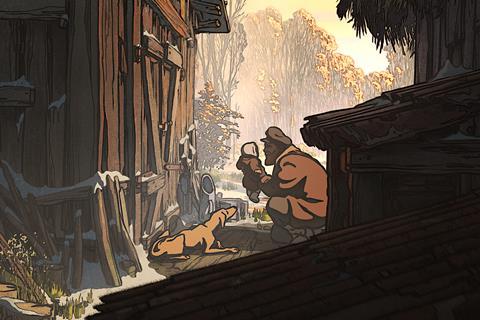Michel Hazanavicius’s animated Competition title is set against the backdrop of Holocaust

Dir. Michel Hazanavicius. France 2024. 81mins
Michel Hazanavicius’s The Most Precious of Cargoes is an odd animated departure for a director best-known for silent-era pastiche The Artist, and comedies including 2022’s creaky Cannes-opening zombie remake Final Cut. His Competition entry is based on a 2019 book by French author Jean-Claude Grumberg, about a woodcutter and his wife who rescue an infant against the backdrop of the Holocaust. Voice-over narration from the late Jean-Louis Trintignant) begins, “Once upon a time…” before warning us that this won’t be a fairy tale of the soppy Tom Thumb variety. Yet, its preciousness could be a turn-off for adult viewers, while younger audiences will find much of the material both too twee and too grimly disturbing to connect with.
Never finds an appropriate register for addressing this most painful of themes
Given the persistence of Holocaust denial, it is all the more essential that films about the Shoah continue to be made – but with the utmost ethical and aesthetic rigour. The fact that Hazanavicius’ film is supremely well-intentioned, and executed with artistic elegance, only makes it all the more glaring a misstep. Yet the director’s reputation as a mainstream draw, at least in France (where it releases on November 20), should provide domestic leverage, and some festivals and outlets may favour the film for its accessible educational dimension.
Set in a snowbound forest in a time and place we soon guess to be Poland during the Second World War, the story is about an impoverished, childless, late middle-aged couple, known only as the Woodcutter and the Woodcutter’s Wife (voiced with gravitas by Dominique Blanc and the dependably gruff Grégory Gadebois). Sometimes the Wife will walk through the snow to watch a passing train, which she worships as a god, praying that it will bring her much-needed bounty. The bitter irony is that we know what she doesn’t – that the train is carrying Jewish prisoners to Auschwitz.
One day, however, the vehicle does bring an offering – a bundle thrown into the snow, which proves to be a baby. We later learn that the child, a girl from a pair of twins, has been dropped fromthe train by her father, desperate for any chance to save her life. The Wife takes the child home and decides to nurture her – but gets a hostile reaction from her husband, who guesses that this is one of the ‘accursed’ race he calls ‘the Heartless’.
Raging and ogre-like, the Woodcutter is in the grip of a virulently superstitious, medieval style of anti-semitism. But the baby’s innocent smiles and happy gurgling work their magical effect, and the Woodcutter starts hearing its heartbeat resounding in everything from logs to spoons. His own heart thawed, he finds himself reluctant to join in with the anti-semitic toasts of his workmates – sparking dangerous suspicions among them.
In the film’s favour, it is not afraid of telling bitter truths about violence, hatred and death. Some key characters meet brutal ends, and the scenes on the train carrying the baby’s family have a genuinely harrowing power that holds back from sentiment, partly because of the stark execution of the character animation (under the aegis of Julien Grande, from the director’s own sketches). But other moments are appallingly misjudged – such as the sudden cut from a bleak dramatic moment to a close-up of two floppy-eared rabbits in the woods.
The worst decision comes in a late sequence showing still, stylised black and white images of the faces of the Auschwitz dead: hellish visions that are crassly coercive in their attempt to elicit stunned horror. There is a difference between the graphic representation of such images in documentary and their decorative amplification here – in sharp contrast with those films, notably last year’s Competition standout The Zone of Interest, that have reminded us of the artistic power, and the ethical decency, of not showing.
The film is certainly executed with expertise: the animation uses muted colours and thick, weighty outlines and a broad palette of textures for the nature images, including light through dense forest. Less convincing is Alexandre Desplat’s florid score, intermittently laced with folksy touches of traditional klezmer (and topped with an incongruously bouncy Yiddish song over the end credits). It, like the film itself, never finds an appropriate register for addressing this most painful of themes.
Production company: Agat Films/Ex Nihilo, Les Compagnons du Cinéma
International sales: Studio Canal chloe.marquet@studiocanal.com
Producers: Patrick Sobelman, Florence Gastaud, Michel Hazanavicius
Screenplay: Michel Hazanavicius, Jean-Claude Grumberg, based on the book by Jean-Claude Grumberg
Editing: Michel Hazanavicius, Laurent-Pelé Piovanni
Artistic direction: Julien Grande
Music: Alexandre Desplat
Main voice cast: Dominique Blanc, Grégory Gadebois, Denis Podalydès, Jean-Louis Trintignant
























